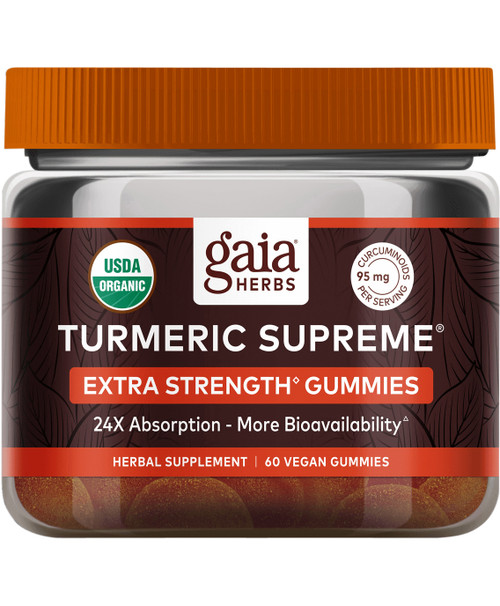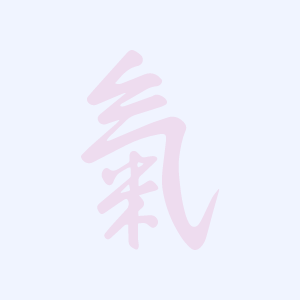

Turmeric Supreme Extra Strength Gummies 60 gummies
BE NOTIFIED
Provide email address to be notified when it’s back in stock.
Gaia Herbs
Turmeric, a revered Ayurvedic herb, is now available in a full spectrum Adult Daily gummy formula. Each serving contains the equivalent of 3.4 grams of Turmeric and 60 mg of curcuminoids to help support healthy inflammatory function so you can maintain your active life-delivered in a convenient and delicious gummy sweetened only with real fruit.
USDA Organic, Purity-Tested, Vegan, Non-GMO, Dairy-Free, Gluten-Free, Soy-Free
60mg curcuminoids per 2 gummy serving size
Adults chew 2 gummies daily. For additional support, chew 2 gummies 2 times daily.
Not for use during pregnancy. If you are nursing, have a medical condition, or take medications, please consult with your doctor before use. Safety-sealed for your protection. Store out of direct sunlight and in a cool, dry place. Store away from children.
Great herbal supplements start with quality ingredients. At Gaia, we certify the purity of our herbs, integrity in sourcing practices, and unmatched potency.
Indigenous to Southeastern and Eastern Asia, this perennial member of the Zingiberaceae family has been used for thousands of years as a traditional medicine, coloring agent and spice. Currently India accounts for much of its cultivation. It is known as Shati in Sanskrit. Reports of its use as a medicine go as far back as 600 BC in Assyrian herbal accounts and can also be traced to Greek writings from Dioscorides. It has been used to support healthy digestion, promote cardiovascular health, and support the immune system as well as used topically and in the eyes in Ayurvedic medicine. In Western herbal medicine Turmeric is used as an aromatic bitter and for supporting healthy liver function.
Ginger and her cousin Turmeric are proud members of the zingiberaceae family and grow in sub-tropical, volcanic soils in the southern hemispheres. The plant is thought to have originated in tropical Asia and is widely cultivated in the Caribbean and Africa. many cultures report similar uses of this plant. It has been used as a favorite "diffusive" circulatory tonic and warming agent, to calm occasional nausea, and to aid in a healthy immune respiratory response. It has also been used to support a normal inflammatory response. Ginger is one of the most widely consumed aromatic spices on the planet.
Lemon, and other citrus fruits are common in the tropics worldwide. Lemon is believed to be native throughout the monsoon regions of Asia, and to have been introduced to the tropics of the Mediterranean and the Americas. Lemons found their way to Italy by 200 AD, and are thought to have been cultivated in Egypt and Iraq by 700 AD. They belong to the Rutaceae family, along with other medicinal plants Buchu (Agasthoma betulina), Rue (Ruta graveolans), and Prickly Ash (Zanthoxylum spp.). They are considered an evergreen tree that can grow up to 20 feet tall, and if the weather allows will continue to grow and fruit all year long. True lemons actually have sharp thorns lining their twigs, though some varieties have been bred to lose this trait. Lemon is not an original citrus fruit, but rather a hybrid between a citron and a sour orange.
Lemon and its citrus fruit cousins became revered by Dutch botanists in the 17th century. Orangeries, which are buildings like greenhouses that were built as extension with many windows to protect exotic trees and plants from harsh northern winters, became popular and common additions to the homes of the wealthy throughout Europe. James Lind (1716 – 1794), a Scottish surgeon, was the first to identify lemons and citrus fruits as a treatment for sailors suffering with scurvy. In rudimentary clinical trials, using 6 pairs of scurvied seamen, those who received citrus quickly recovered. Lind's work was published in Edinburgh, Scotland in 1753, under the name Treatise of the Scurvy, and he is credited with the discovery of the cure.
Organic apple juice concentrate, organic apple puree concentrate, organic mango puree, organic pineapple juice concentrate, organic lemon juice concentrate, pectin (from apple and orange), organic rice flour, organic sunflower oil, organic carnauba wax, organic acacia gum, and organic quillaja extract.
Corn, Dairy, Gluten, Peanuts, Shellfish, Soy, Sugar, Tree Nuts, Yeast